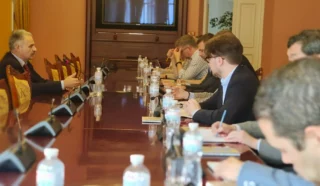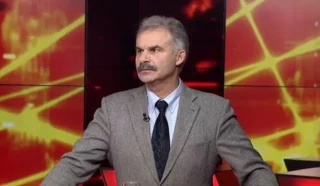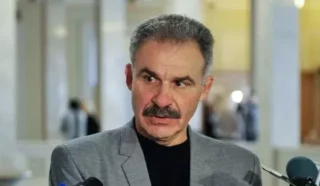Metropolitan of Nizhyn and Priluky Kliment gave a detailed commentary on the published letter of the SSEFC, in which demands are made to the UOC for its withdrawal from the ROC.
The bishop noted that representatives of the National Preserve “Kiev-Pechersk Lavra” and the leadership of the Kiev-Pechersk Lavra periodically hold meetings at which certain working issues related to the further functioning of the cave complexes and the monastery itself as a spiritual cell are discussed. After all, “until the final court decision on all issues related to the claims of the Ministry of Culture to the agreement on the basis of which the Lavra and the Kiev Theological Academy use their premises, the monks and students have every legal reason to be in this monastery.”
“When such a proposal for a working meeting once again appeared, it was about the fact that, in addition to the leadership of the reserve, the Minister of Culture and Information Policy Alexander Tkachenko would also take part in it,” the bishop said and added that “with the blessing of His Beatitude Metropolitan Onufry, this The meeting was also attended by the rector of the Kiev Theological Academy and Seminary, Archbishop Sylvester of Belogorodsk, a member of the Lavra’s Spiritual Council, Archimandrite Nestor, lawyers and advocates of the monastery.
However, instead of the Minister of Culture, the meeting was attended by the head of the SSEFC Viktor Yelensky, the head of the department for the preservation of cultural heritage under the Ministry of Culture and the acting director of the national reserve.
“Therefore, it is somewhat strange that Mr. Yelensky advertises this event as a meeting between the leadership of the SSEFC and members of the episcopate of the Ukrainian Orthodox Church. After all, other authorized people were also present at it, who discussed a number of specific practical things related to their competence,” the bishop emphasized.
Most of the time at the meeting, Viktor Yelensky led a discussion with representatives of the UOC, which did not concern either the preservation of architectural and historical monuments, or the maintenance of a large territory of the monastery, for which the reserve lacks resources.
According to the bishop, “Mr. Yelensky expressed certain claims against the UOC, but did not explain how they are connected with the breach of the agreement on the use of the Lavra buildings.” And when the head of the SSEFC was asked to elaborate on claims to the statutory documentation of the UOC, or specific actions and statements of its leadership, he “began to refer to incorrect publications in the press and video content on social networks, which, of course, was not enough.”
“Therefore, the idea arose to propose the SSEFC, if its representatives see disagreements between Ukrainian legislation and the structure of the UOC, to formulate specific proposals that would remove such contradictions and expand the range of cooperation between the museum institution and the monastery,” Metropolitan Kliment noted.
After this meeting, Yelensky informed the public about the written letter to the leadership of the UOC, “in which, in a somewhat strange, as for an official letter, form, he proposed a list of actions on the part of the Ukrainian Orthodox Church, which would unequivocally testify to its withdrawal from the Russian Orthodox Church.”
Metropolitan Kliment outlined his assessment of the letter as follows:
“Firstly, the content of the letter contained a wish for specific actions on the part of the UOC, and not the continuation of a written discussion, examples of which are already contained in the archive of the SSEFC.
Secondly, the author significantly overestimated the status of the modest addressees of this letter, who are completely not authorized to act from the fullness of the UOC.
Thirdly, from the text of the letter, written in the subjunctive mood, it again follows that the proposals listed in it are only the fruit of personal reflections of the head of the SSEFC on the issue of interaction between the Church and the state in Ukraine.
However, these reflections do not contain any guarantees of expanding the trajectory of this interaction.
The key point is that any response of the UOC to the demands of the SSEFC does not create a guarantee of readiness on the part of the ministerial service to remove the restrictions that UOC believers experience in matters of religious freedom and their rights, as well as to resolve the issue of the threat of turning the Kiev-Pechersky Monastery into a total museum.





2 Comments. Leave new
Владыко, всё правильно сказали. Бог вам в помощь.
Митрополит Климент митрополит Онуфрій в черговий раз не висловили ніякої конкретики, а лиш осоромили себе і нашу УПЦ.